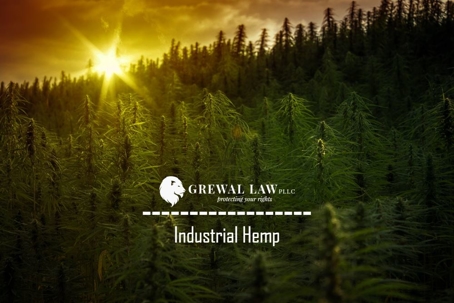The passage of Proposition 1 (now codified as the Michigan Regulation and Taxation of Marihuana Act, MCL 333.27951 et seq.) has received significant attention for legalization the use of recreational marihuana throughout Michigan. Often-overlooked, however, was the MRTMA’s simultaneous legalization of industrial hemp. This crop offers a unique opportunity for many Michigan retailers and farmers, and could be Michigan next boom industry.
What is Hemp?
Hemp, although derived from the cannabis plant, is not marihuana. The MRTMA defines “industrial hemp” as “a plant of the genus cannabis…with a [THC] concentration that does not exceed 0.3%.” MCL 333.27953(c). Federal law has a similar definition. 7 USC 1639o(1). Practically, hemp is distinguishable from marihuana in that it does not produce psychoactive effects. Hemp can be used for a wide variety uses, ranging from paper, rope, biofuels and other textiles. At a consumer level, hemp is most commonly processed into cannabidiol (“CBD”) products, which have been used to treat a variety of common physical and psychological ailments.
Hemp’s Status Under Michigan and Federal Law
The MRTMA legalized the possession, cultivation, transfer, or transportation of industrial hemp. MCL 333.27960(i). Apart from that general legalization, however, the MRTMA is largely silent on industrial hemp, choosing instead to delegate the responsibility for regulating hemp to the Department of Licensing and Regulatory Affairs. MCL 333.27958(2)(b). To date, rules have yet to be promulgated under the MRTMA.
Coincidentally, the federal government also acted on the issue of hemp in 2018. The Agriculture Improvement Act of 2018 (“the Farm Bill”) authorized the cultivation of hemp and approved the transfer of hemp across state lines. Farm Bill § 10114. The Farm Bill also clarified that hemp, and hemp products, are not considered “marihuana” for purposes of the Controlled Substances Act. Farm Bill, § 12608. Thus, the Farm Bill, when combined with the MRTMA, legalized hemp on both a state and federal level. As part of this legalization, the Farm Bill requires states to develop a licensing and regulatory regime for industrial hemp, which must be approved by the Secretary of Agriculture. Farm Bill §10113.
Michigan has already taken the first steps to developing a statewide hemp program. As of December 28, 2018, Michigan passed Public Acts 641, 642, and 648 of 2018, each of which dealt with the issue of industrial hemp. Under Public Act 641, the Michigan Department of Agriculture and Rural Development has been tasked with creating Michigan’s framework for hemp regulations. Given the requirements of the Farm Bill, these regulations will include rules designed to track hemp production, ensure that hemp does not contain an excessive THC content, and is disposed of properly. Farm Bill, § 10113.
Ultimately, the precise nature and scope of hemp regulation in Michigan is yet to be determined. It is reasonable to assume, however, that the licensure process for hemp and hemp-derived products will be less intensive than those applying to marihuana licensing.
Practical Considerations
Michigan citizens should be mindful that no licensing regime has been developed at the state or federal level. Thus, entrepreneurs should be avoid cultivating, processing, or selling hemp and hemp product until a license can be obtained. Unlicensed hemp-related activities are not likely to be viewed favorably under the to-be-developed state or federal regulations, and could be a barrier to future licensing.
What Can Michigan Citizens Expect Moving Forward?
It is reasonable to assume that MDARD’s industrial hemp plan will require interested parties to submit personal information and information relating to the planting, processing, or sale of hemp. Regular inspection and reporting requirements are almost certain to be included. Given hemp’s lack of psychoactive properties, however, it is also reasonable to assume that the licensing process will be less burdensome and more affordable than the marihuana licensing process. In light of hemp’s variety of uses, entrepreneurs should carefully monitor developments in this area to ensure that they are able take advantage of opportunities in this emerging industry.
For more information about marijuana law in Michigan, contact Grewal Law today at (888) 211-5798 and schedule a free consultation.





